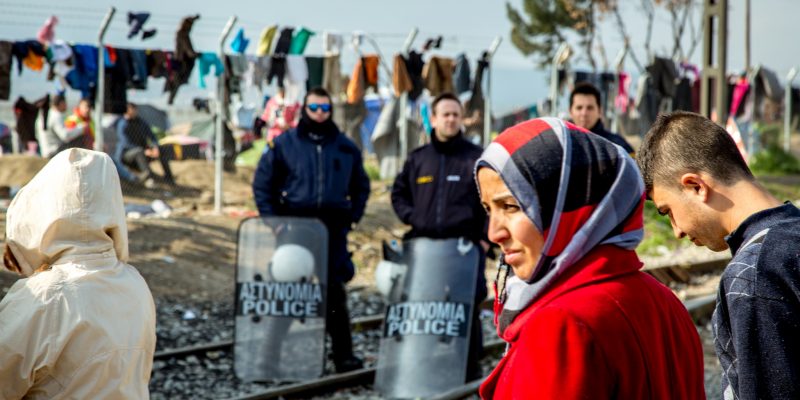1. Idomeni: a humanitarian crisis faced with bulldozers
The “peaceful evacuation” – performed by riot police and bulldozers (and far away from journalists and volunteers’ eyes, who were not allowed access to the area during the operations) – of the biggest European refugee camp has been concluded in record time. Here, at the border between Greece and Macedonia, where thousands (including many minors) have been living in disastrous conditions for months, once again an humanitarian crisis has been treated as a public order issue – says Annalisa Camilli (Internazionale).
Greece is moving thousands of migrants from Idomeni camp. Find out more: https://t.co/pbfcaqMlFShttps://t.co/Q8FWSLbmB3
— Reuters Top News (@Reuters) May 24, 2016
2. Goodbye Idomeni
Silence fell upon the abandoned makeshift camp, all at once.
The spectral bleakness of the emptied Idomeni valley – narrated by VICE’s photo-reportage and The Washington Post’s article.
3. Many little Idomeni
What happened to the thousands of persons camped at Idomeni?
More than half of them (that is, around 4,000 people) refused to board buses heading to organised camps and set out for the fields instead; they are now probably camped in the nearby woods on the border with Macedonia or in the streets of Greek cities such as Thessaloniki.
Almost 3,000 people were instead transferred in camps set up in former military and industrial facilities. NGOs and volunteers operating in the area have already raised grave concerns over the dire conditions in such “formal camps”: in Sindos, for example, “there are three dusty hangars with not enough air and light and only 18 bathrooms for 600 people – including many children several pregnant women” (as reported in Vita); things are not better in the camp created in a former industrial warehouse just outside Thessaloniki – here, it denounces The Guardian, asylum seekers are forced to live in conditions which are “not fit for animals”.
Protests grow as Greece moves refugees to derelict warehouses ‘not fit for animals’ https://t.co/WAQ7gjvyk8
— The Guardian (@guardian) May 28, 2016
4. Greece: where asylum requests can (not) be submitted through Skype
A collapsing system: in Greece – and not only at Idomeni (as narrated by Annapaola Ammirati in her reportage for Open Migration)– asylum requests can only be submitted through Skype. The problem is that the resources invested in the online asylum service are not enough and nothing works as it should: “we tried to call so many times, but nobody answered” tell the asylum seekers interviewed by Refugees Deeply.
5. All what you need to know about refugees crisis according to The Economist
The Economist dedicates a 15-pages special to the migrant crisis – which includes a very clear data-based map and a straight-on-point analysis of the global dimension of the phenomenon as well as a strong critique of the “murky” EU-Turkey deal.
Mapping the world's refugees https://t.co/chZi76Uquc pic.twitter.com/ajm2Uy0X1w
— The Economist (@TheEconomist) May 27, 2016
6. The unbearable costs of the EU-Turkey deal: the Mediterranean route gets busier and deadlier
As a consequence of the agreement of Turkey, arrivals in Greece have dropped by 90% – but this does not mean that Europe has solved its crisis, as someone suggested. In fact, there is nothing to be celebrated: concomitantly landings in Italy have sharply increased and, as the dangerous Mediterranean route gets busier and busier, deaths at sea are increasing once again (despite the tireless work of the Italian Guardia Costiera which rescues thousand of persons every week).
When will we learn that closing a route only means opening another, more dangerous one? The solution is not signing deals such as the one already done with Turkey and the one some wish to discuss with Libya, but rather to open humanitarian corridors. The analysis by Al Jazeera.
7. The unbearable costs of the EU-Turkey deal: turning refugees into prisoners
The recent, much discussed decision of the Greek authority for refugees – which approved the complaint of a Syrian asylum-seeker against his compulsory return to Turkey, on the basis of it not being a “safe third country” – has questioned the very legal basis of the EU-Turkey deal.
It is now time to think about the growing number of refugees who can neither enter in Europe nor leave – and how this is paving the way for mass detention of asylum seekers. The in-depth analysis of Brad K. Blitz for Open Democracy.
8. The unbearable costs of the EU-Turkey deal: the exploitation of Syrian minors in Turkey’s factories
The reportage by Gabriele Zagni and Valentina Petrini for Piazzapulita denounces the drama of the Syrian children exploited in Turkish textile factories: here it is what really happens in Erdogan’s country, where young refugees escaping from war are enslaved to produce jeans and shoes.
9. If this is a refugee shelter
The reception of asylum seekers does not pose a concern only for Greece. Almost everywhere in Europe facilities to shelter asylum seekers are improvised in a variety of locations: for example, in the Netherlands there is an old prison hosting 400 asylum seekers – the place in itself is not even that bad, according to the BBC, and indeed the model as already been replicated in other former criminal institutes – whereas in Berlin there are as much as 1,300 refugees hosted in spartan huts in the former airport of Tempelhof (as documented by VICE).
10. Welcome to Italy: unaccompanied minors against the mafia
Then there is Italy. Here, in the Calabrian town of Nicastro, twelve unaccompanied minors are now living in a house which was confiscated to the local ‘ndrangheta clan, with the former owners as neighbors: don’t miss the video-reportage by Raffaella Cosentino and Mario Poeta for Welcome to Italy, an investigative report in five parts on migrants’ reception in Italy (curated by Stefani Liberti for Internazionale).
(Header photo di Julian Buijzen via Flickr Creative Commons)









